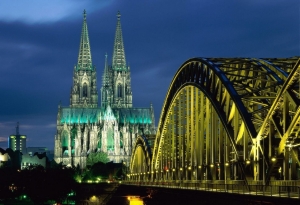Encountering God in the Heart of the City
27th Plenary Assembly of the Pontifical Council for the Laity
Rome, 5-7 February 2015
“Encountering God in the Heart of the City: scenarios of evangelisation for the Third Millennium” is the theme of the 27th Plenary Assembly of the Pontifical Council for the Laity to be held in Rome from 5 to 7 February. The Church has shown increasing interest in the issue of urbanisation, and this can be seen in the teachings of the popes from Paul VI until the present Pope Francis. For example:
“Today the image of mission ad gentes is perhaps changing: efforts should be concentrated on the big cities, where new customs and styles of living arise together with new forms of culture and communication, which then influence the wider population. It is true that the ‘option for the neediest’ means that we should not overlook the most abandoned and isolated human groups, but it is also true that individual or small groups cannot be evangelized if we neglect the centers where a new humanity, so to speak, is emerging, and where new models of development are taking shape” (John Paul II, Redemptoris Missio, no. 37b).
When Pope Francis was Archbishop of Buenos Aires, he gave a major talk on the subject which was subsequently published in the book “God in the city”. It can be seen that urban pastoral ministry is central. This can also be seen in the apostolic exhortation Evangelii Gaudium numbers 71 to 75. United Nations figures report that the urban population has exceeded that of the rural population since the year 2007, and that by 2050, more than 70% of the world population will live in urban centres. This is an unprecedented phenomenon in the history of humankind. It is a kairos for the Church, a “time of grace” that heralds new cultures with rich potential, but that also present many problems and challenges. The Plenary Assembly will give us an opportunity to look at this complex and gigantic process with the eyes of faith. Indeed, although apparently modern secularised cities are content with their well-being, riches and technological achievements, and seem to have finally put God on the bench and demoted faith to the private sphere, a careful observer cannot avoid seeing that the hearts of many men and women in the city have never stopped searching for meaning. They thirst for God. They cry out with Garaudy, “Give us transcendence”.
In particular, the many “geographical and existential peripheries” that belong permanently to the same genetic code as that of the big cities, challenge the Church and send us out now more than ever in the direction of pastoral and missionary conversion so that ours will be an outgoing Church, moved by a healthy concern for God and for human beings.
With the help of experts – sociologists, biblical scholars, people in pastoral ministry, clergy and lay people working in the field –, we will investigate the urban reality of the past and present in order to understand the dynamics, languages, opportunities and weaknesses. We will do it with the purpose of outlining scenarios for a new evangelisation. Together we shall identify the current situation of urban pastoral ministry and focus on city parishes; on the aesthetics of the “geography of grace” in the urban context; on pastoral workers, and more particularly on the laity, Christians and citizens, individually or in groups. We shall study paths that can help people in cities to discover and meet God who goes before us into the city of humankind. We shall talk about gatherings as a strategy to communicate God in the heart of the city. There will be testimonies from people who have made the city their field of apostolate. Our reflection will be anchored in the Bible, and this will reveal the ambiguities that have always been in cities, but above all it will help us to grasp its deeper meaning as a locus theologicus, the ground on which the History of Salvation is played out and the place in which Christianity itself was born .
This is the first assembly after the appointment by Pope Francis of new members and consultors to the Pontifical Council. It will be an opportunity for them to get acquainted and to build up communion. The new appointees will be introduced to the Pontifical Council and its activities, and their own role will be explained.


